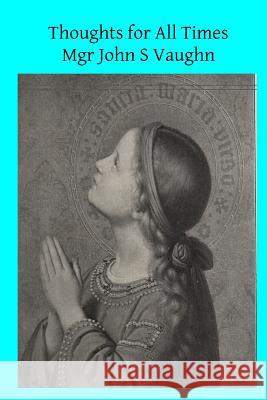Thoughts for All Times » książka
Thoughts for All Times
ISBN-13: 9781496092830 / Angielski / Miękka / 2014 / 428 str.
THIS is an age when every good and Christian writer who can" get himself read," as Carlyle would say, should print and publish as much as he can. For as evil writings do incalculably more harm than evil speech, so good writings are indefinitely more efficacious than mere spoken addresses. Our Holy Father, Pope Leo XIII., has exhorted us to oppose writing to writing-" scripta scriptis,"-to use the press to fight against the press. It is consoling, therefore, to welcome a new book by a writer who can securely count on a large number of readers. It would be a mistake to call these essays of Monsignor Vaughan by the name of sermons. They have neither the sermon form nor the sermon tone. It is true that the greater part of the book deals with religious Subjects. It is true, also, that in some places the writer takes the opportunity of enforcing a moral point. But they are essays, not sermons. The difference lies chiefly in the attitude of the author. A sermon supposes a preacher-and a preacher is an official personage, standing in the sanctuary, and clad in ministerial robes. The essayist claims no official position, and speaks as one man to another. His audience is not his flock; but individual men and women, with faculties that can understand, and important interests to think about. There is no reason why such topics as God and God's love, the Blessed Sacrament, and the Last Things should not be calmly and earnestly discussed, without strong appeals to the feelings, or that assumption of authority which is so useful and so necessary on fitting occasions. This book contains some twenty papers, most of which have already appeared in print. They are distributed in three divisions and tnay be said to fall under three heads. First we have five essays on God and the Holy Trinity. The "Love" of God, the" N atu re " of God, the "Wisdom" of God, make up three of the titles found in this first part. Without being abstruse or scholastic, the treatment is solid, interesting and suggestive. The two essays on the "Blessed Trinity," first, as Reflected in Man and next as traceable in the Irrational Creature, are good examples of that kind of" apologetic" work which does not pretend to be demonstration, but is valuable as showing how the mind might reasonably expect some such stupendous revelation as the Trinity. The second division of the book opens with two very interesting disquisitions on the Blessed Sacrament. These are followed by two on the subject of Purgatory-showing the reasonableness of the Catholic doctrine, and the nature of purgatorial suffering. Then we have other two on that Divine quality and stimulus of the soul which are called supernatural grace, and the manner in which, through grace, a human being may be united to God. The third division is more miscellaneous. In the" Riddle of Human Life" we find a useful exposition of the end and purpose of mortal life. "Dust to Dust" unmistakably indicates a lesson to be learnt from death. "Man a Microcosm" is a study on the difference between man and the beast, leading up to the consideration of those supernatural motives which man has the power to see, if he will. " Pain as a Motive" explains itself. "Heroes: True and False" is an examination of the state of mind which prevents most men from becoming saints. The paper that follows, entitled "The Inconsistency of our Faith and Practice," pursues this subject still further, and insists on the view that what is required is not so much to know more than we do know, but (like a St. Francis Borgia contemplating the dead queen) to realise what we know already. Then follow two useful controversial papers on Protestantism. The last essay in the book is on "Vivisection"
Zawartość książki może nie spełniać oczekiwań – reklamacje nie obejmują treści, która mogła nie być redakcyjnie ani merytorycznie opracowana.











